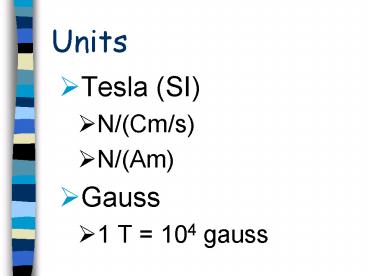Units - PowerPoint PPT Presentation
1 / 27
Title:
Units
Description:
Title: Bell Quiz Author: Phyllis J. March Last modified by: pbertrand Created Date: 3/29/2001 8:15:44 PM Document presentation format: On-screen Show – PowerPoint PPT presentation
Number of Views:25
Avg rating:3.0/5.0
Title: Units
1
Units
- Tesla (SI)
- N/(Cm/s)
- N/(Am)
- Gauss
- 1 T 104 gauss
2
MagneticDipole
Magnetic Field (B)
3
Magnetic Monopoles
- Do not exist!
- In this way they differ from electric dipoles,
which can be separated into electric monopoles.
4
Magnetic Force on Charged Particle
- magnitude F qvBsin?
- q charge in Coulombs
- v speed in meters/second
- B magnetic field in Tesla
- ? angle between v and B
- direction Right Hand Rule
5
Magnetic Force
Calculate the magnitude and direction of the
magnetic force.
v 300,000 m/s
34o
q 3.0mC
B 200 mT
6
Magnetic Fields
- Formed by moving charge
- Affect moving charge
7
Magnetic Forces can...
- accelerate charged particles by changing their
direction - cause charged particles to move in circular or
helical paths
8
Magnetic Forces cannot...
- change the speed or kinetic energy of charged
particles - do work on charged particles
9
When v and B are at right angles to each other...
- qvBsin? mv2/r
- qB mv/r
- q/m v/(rB)
10
Electric and Magnetic Fields Together
v E/B
11
Magnetic Force on Current-carrying Wire
- F I L B sin?
- I current in Amps
- L length in meters
- B magnetic field in Tesla
- ? angle between current and field
12
Magnetic Field forLong Straight Wire
- B ?oI/(2?r)
- ?o 4? ? 10-7Tm/A
- magnetic permeability of free space
- I current (A)
- r radial distance from center of wire (m)
13
Hand Rule
i
- Curve your fingers
- Place your thumb (which is presumably pretty
straight) in direction of current. - Curved fingers represent curve of magnetic field.
- Field vector at any point is tangent to field
line.
14
For straight currents
15
Principle of Superposition
When there are two or more currents forming a
magnetic field, calculate B due to each current
separately and then add them together using
vector addition.
16
Beyond the 4th Grade
17
Magnetic Field Inside aSolenoid
- B ?onI
- ?o 4? ? 10-7Tm/A
- n number of coils per unit length
- I current (A)
18
Lab Magnetic Field Map
- Using a compass, map the magnetic field inside
and outside your solenoid. Show the following - Tracing of solenoid (true size)
- Current through solenoid
- Connection to DC outlet
- Field lines mapped with compass
- Edge effects (What happens to those field lines
farther away from the solenoid? Can you explain
it?) - North and South Poles of solenoid
- The Compass Rose
- One drawing per group (Write all names on paper)
19
Lab EvaluationMagnetic Field MapA) Are field
lines visible in the core of the solenoid?B)
Are the directions of the field lines in the core
consistent with the Right Hand Rule?C) Are the
North and South Poles correctly identified?
20
Magnetic Flux
- The product of magnetic field and area.
- Can be thought of as a total magnetic effect on
a coil of wire of a given area.
21
Magnetic Flux
- FB BAcos?
- FB magnetic flux in Webers (Tesla meters2)
- B magnetic field in Tesla
- A area in meters2.
- ? the angle between the area and the magnetic
field.
22
Magnetic Flux
- A system will respond so as to oppose changes in
magnetic flux. - Changing the magnetic flux can generate
electrical current.
23
Faradays Law of Induction
- e -NDFB/Dt
- e induced potential (V)
- N loops
- FB magnetic flux (Webers, Wb)
- t time (s)
24
A closer look
- e -DFB/Dt
- e -D(BAcos?)/Dt
- To generate voltage
- Change B
- Change A
- Change ?
25
Lenzs Law
- The current will flow in a direction so as to
oppose the change in flux. - Use in combination with hand rule to predict
current direction.
26
Announcements
- AP Review every morning at 700 AM.
- Lunch Bunch tomorrow (come with pretest
completed). - Exam Thursday
- 1988 AP Free Response Thursday and Friday, after
school or at lunch
27
Challenge Problem 3
How large a force is needed to move the rod at a
constant speed of 2 m/s? How much power is
dissipated in the resistor?
B 0.15 T
50 cm
3 W
v 2 m/s































